Saturday, June 4th:
I am currently sitting at a gate in the Detroit Airport, waiting for my flight to Tampa to start boarding at 2:40. I made my dad leave earlier than we had planned–partly because of all the construction and partly because I couldn’t stand sitting in my house anymore, just waiting. I spent all morning running around, packing up last-minute items and weighing my bags and running out to Meijer to buy some toiletries and an SD card that I had forgotten about.
 There’s so much I feel like I’ve forgotten. So much I probably should have prepared for. Maybe I should have at least taken a crash course in Spanish, or at least bought one of those “popular phrases” books. Should I have looked into Zika? Or was it a huge mistake that I hadn’t gotten a single shot in preparation for this trip to a third-world country?
There’s so much I feel like I’ve forgotten. So much I probably should have prepared for. Maybe I should have at least taken a crash course in Spanish, or at least bought one of those “popular phrases” books. Should I have looked into Zika? Or was it a huge mistake that I hadn’t gotten a single shot in preparation for this trip to a third-world country?
So I decided to write this first anticipatory blog post here in the airport, in an attempt to keep my thoughts at bay. To keep my inner anxieties and worries from imploding within me. I just need to relax.
And that’s honestly the thing I’m most looking forward to in Cuba. I understand that it is a school trip and we’ll be covering a lot in this week, but I’m most excited to just take a break.
The Cuban lifestyle, based on what we’ve read and heard and discussed, is very relaxed. They go with the flow–something I tend to do as well. Of course, this is often synonymous with being lazy and, here in the States, laziness gets you into trouble.
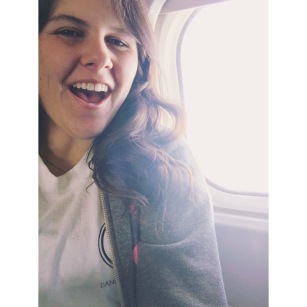
But in Cuba, they wait. They don’t over-prepare. They go about their days and smile at the present and laugh away worries. (Again, these are generalizations based on my small frame of reference, but this is what I know to be true before visiting the country itself.)
I’m excited to indulge in that lifestyle and soak up everything in the moment it is presented, and then have time to reflect–on the bus, in the lobby, walking down the street. I’m excited to have time to think to myself as all of these new experiences come to me.
We have four lecturers and daily excursions. We’ll get to see the US Embassy and Radio Havana and even inside Granma. But instead of being in the States, where I go from my education classes to work to journalism classes to socializing–from twitter to instagram to snapchat–jumping around as frequently as my brain does, I’m excited to just focus on one thing for prolonged periods of time. I’m excited to soak it all in.
Monday June 6th
On the first day in Cuba, I woke up next to Olivia Weinberg on a small, twin-sized bed. Our classmates, Angela Hatcher and Adina Ahlstrom were kind enough to let us crash in their room after we found a cockroach in my bed back in room 321. It was a subtle “welcome to Cuba” message that Olivia and I received loud and clear.
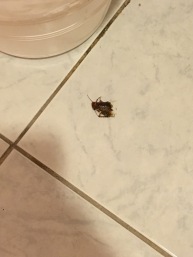
Fortunately, we slept pretty well in that tightly packed room, and we were ready to take on the first day of our study abroad adventure (this was the day we discovered and fell in love with Cuban coffee).
The day started with an embassy visit, where we were briefed on the history and present on Cuban and American relations. Afterwards, a yellow school bus with loud Spanish music and colorful decorations picked us up and dropped us off at the Marti Center. I wish my ten years of riding a bus to school could have been on a bus like this–although I did miss the air conditioning on the short ride, and we did wait a decent amount of time for it to come. There’s a lot of give and take in Cuba.
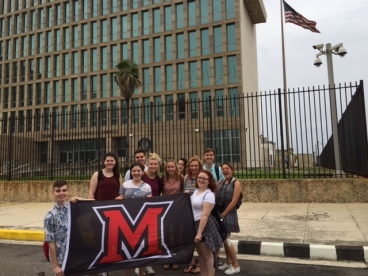
Our first lecture was about Jose Marti, himself, who Marlene Vazquez Perez referred to as “The King Midas of Poetry: his words were gold.” She prided him on his ability to always be himself and remain loyal–someone who never tried to assimilate. I loved learning about this Cuban hero–this martyr. She left us with a list of works we could read and instructed us to check out CubaNow to read more of his writing.
The rest of the day was slightly hindered by the power outage that came on at the end of Perez’s lecture. She hardly paid it any notice, so the rest of us followed suit. It was interesting once we went deep into the city, however, because without lights to direct the drivers, the noise from the street grew significantly.
Still, they got by as if it were any other day. There were no accidents that I saw, and we still traveled around pretty much the same as before. Cubans are used to adapting, so we’ll just have to learn that trait too.
Tuesday, June 7th
I woke up late on Tuesday and showered so quickly that I didn’t even notice at first that there was a woman on the balcony outside, peering in at me through the window next to my showerhead. It’s these little things I think that give Hotel Vedado character.
We took a bus to the Marti center and learned about the Cuban Economy from Dayrelis Ojeda Suris. The most interesting part of this lecture, I thought, was the talk about remittances. Dayrelis and Manny (our tour guide) both agreed that most Cubans seem to have family in the United States that send them money each month. Dayrelis told us that once a month she gets a knock on her door and a man hands her 100 CUCs that her father sent her. She also explained that there is no current limit on remittances from The Obama administration, but some Cubans are worried about what might happen come January, when either Hillary Clinton or Donald Trump move into the White House.
In the afternoon, our group headed over to Granma, where Karina Marron Gonzalez, the national newsroom department head, gave us a tour. Afterwards, she sat down with us and answered any and all questions we had about how a socialist newspaper is run and how they report their news.
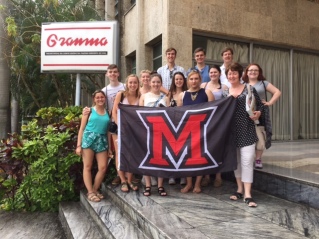
The purpose of the newspaper, according to Gonzalez, is “if Granma says so, it’s true. If Granma says so, it’s important.”
She discussed the importance, she feels, of not sensationalizing stories. Rose Press (celebrity news and gossip) and Red Press (murders and other gory stories) do not hold the same interest to Cubans as they do Americans. She admitted that this leads Cuban news to sometimes be regarded as boring, but I believe it’s the principle of the thing. I admired the way she spoke on this topic.
Finally, what I found to be most interesting, was when she discussed critiques. Every Friday, they print two pages of opinions. “We believe the first commitment is to the people,” she commented.
She was also the first person so far to mention a fair critique of the education system: just because it’s free, doesn’t mean it’s great. It doesn’t mean it’s flawless. It doesn’t mean it can’t improve.
So far, our trip to Granma has been the most pleasantly surprising, thought-provoking, and enjoyable excursion yet. I’m excited for what the rest of the week has in store.
Wednesday, June 8th
Arnaldo Coro Antich walked into our class of thirteen at the Marti center ready to improvise. As the senior advisor to Institute of Cuban Radio & Television and Radio Havana Cuba, and having a rich history with radio, this was something he was used to–something he had been practicing. “It takes a lot of training,” he told us. “You must convince the listener that you really know what you’re talking about.”
He told us a brief summary of his life, sprinkled with a few pieces of advice, a couple of opinions, and a handful of contradictions, but he was right about that: he was a great improviser.
In 1949, at the age of seven, Antich became a voice actor because of two reasons: there was a demand for young voices in soap operas, and his father was the doctor for the owner of a radio station. It worked out in a weird way that seems to only happen to the lucky ones.
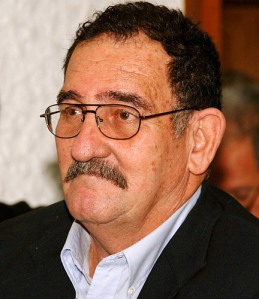
He went to school to learn about programming and eventually got a great mentor who showed him the ropes. “Learn from the inside,” he said. “Forget about the theory and try to find what’s really going on.”
That’s how he became a good electronic technician by age 19. He was always willing to learn–always motivated by something. He told us how, when he was studying at the University of Havana, he went to every psychology class just because his teacher was beautiful. He didn’t want to miss a lesson. This resulted in a newfound understanding of clinical and social psychology and he stressed to us the importance of taking at least one of these classes.
Then he started to get a little contradictory.
He explained the decline he saw of written language, blaming earphones and screens because of their tendencies to impede communication and cause isolation. He even went so far to point out that he, himself, owns the most primitive phone because he doesn’t want to be distracted.
But then he stressed the importance of feedback. For someone who seemed so immediately anti-technology, he then started praising what it allows us to do, almost without realizing it.

He mentioned that cell phones nowadays have FM and how essential radio is to modern life, but this is still through the use of technology. He talked animatedly about all of the emails he would receive and how wonderful it was that Cuba’s infrastructure is developing (he announced that in a country of 11 million, there are 2 million email addresses), yet he warned us strictly not to overdo it. The preceding advice for this warning, however, was “if you think you can survive in mass communication processes without feedback, you are lost.”
I agreed with these nuggets of wisdom, but it just seemed to me that he was afraid of new technology because of the stigma that is commonly attached. Instead of seeing a person with headphones in their ears as a possible listener of his own radio show, even, he saw a distracted and isolated citizen. This viewpoint was puzzling to me, as it was coming from someone who works in mass communication. It was even more ironic when he announced, “here in Cuba you have to be well adapted to changing life.”
Still, the stories he told of his life and the sprinkled pieces of advice were intriguing at the very least. This is the kind of guy whose brain you’re just eager to pick. He told us what he thought of entertainment (Radio is the queen, TV is the king) and how he felt on censorship (“I call it proper filtering”). He is an opinionated man who has lived a life he is eager to share. I was just part of the captivated audience that was genuinely interested in what he had to say.
Friday, June 10th
Ever since I visited New York City when I was fourteen years old, I thought I would one day move to the city. I was fascinated with the fast-paced lifestyle and loved the idea of a city that never sleeps. I loved having a busy schedule and endless possibilities.
On our last day in Cuba, I had a change of heart.
We drove about an hour away from Havana to a place called Las Terrazas. Here we found a community that lived on the twelve thousand, five hundred acres–a community that was friendly in every sense of the word. Our tour guide, Anais Tomayo, was amazing. She told us about her life and cracked jokes the whole time. She was knowledgeable about everything and shared anecdotes and welcomed questions. She truly wanted to us to learn as much as we could about this Cuban gem, and we were eager to soak up all the information.
The people of the town planted 6 million seedlings, she told us as she pointed out to the beautiful mountains filled with trees. “All this green did not exist.”
The village was founded in 1971 and in 1985 it was declared a biosphere reserved. This meant that it was now a protected area where people could no longer hunt or fish or work in the forest. In order for the people of the area to adapt to life without these jobs, tourism was introduced in 1994. Now 70 percentof the people work for tourism, which is great because it is increasing rapidly. With a huge smile on her face, Anais told us that in 1994, nearly 2,000 tourists visited the area. Last year they had close to 60,000.
It’s clear why. The place is gorgeous and the people are so willing to teach about their lives and the self-sustainability. In fact, there’s even a waiting list to live there because it’s a limited population and they can’t build any more houses or apartments in the area.
On our tour we visited Ariel Gato, a paper artist, and Maria’s Cafe, where the best coffee in Cuba is served.
My favorite part, though, was the school.
In many of my classes as an education major, we discuss the necessities of successful schools. By far the biggest recurring theme is community. It goes with the whole “it takes a village” mentality. Children succeed far more when the education is more involved. This includes teamwork between administrators and parents and teachers, but it also includes welcoming the students into the community.
The Oriental Republic of Uruguay, the name of the school in Las Terrazas, has all of this.
I won’t bog down the end of this blog post with the details (because my final project is filled with them), but this is what sparked my change of heart. I could have spent all day at that school, just asking questions and talking to students and teachers and observing their daily life. Socialism is always great in theory, poor in practice. This is how I felt whenever we would talk about ideal schools in my classrooms in the States.
But this rural school seemed to have at least some of the answers to questions we’ve long been discussing. It was refreshing and inspiring to see and I wish I could have stuck around longer–picked some more brains–dug around deeper.
I know it has to have flaws. With everything in Cuba there is give and take, after all. But this was my favorite place we went, even if it was being presented to me through rose-colored glasses.
Sunday, June 11th
I am back in Perrysburg now. Back to hot showers and English speakers and being able to brush my teeth by using tap water. I can now walk down the streets without hearing “I luh you, I luh you” and I can snapchat every second of my day if I so choose.
I’m going to miss Cuba, though. I’ll miss the hypnotizing bus rides where I would just stare out the window and watch the architecture change and the old cars pass. I’ll miss the coffee each morning and the “omelette con jamón y queso” (did I spell that right?) that Marissa, the hotel cook, would make after acknowledging my efforts to speak Spanish with a patronizing, but warm, smile. I’ll miss the people we talked to–Manny and Anais and Coro and Karina Gonzalez–but I’ll remember the stories they told.
I’m returning to the states as a slightly different person. I’ve seen, firsthand, how things run in a socialist country. I saw the benefits of a school like the one in Las Terrazas, but I heard the problems that are caused by lack of resources. I noticed what information was being presented with a strong slant (like the lecture from Karell Acosta Gonzal) and was presently surprised when questions were answered with transparency (specifically like Karina Gonzalez’s interview).
Being submerged in a completely new culture for a week was eye-opening and invigorating. It fed my hunger to travel and motivated me to make some changes once I’m home.
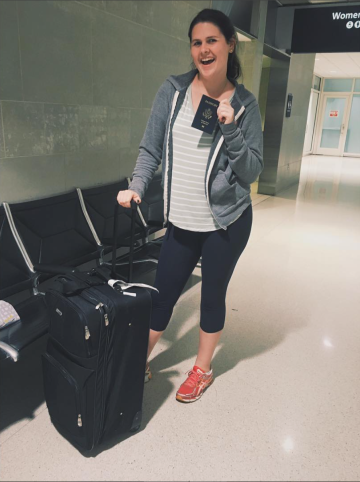
I will return to Cuba one day, and I know it will be different, but so will I. I want to learn Spanish now and actually be able to converse with the locals. I now know so much more about our diplomatic relationship and will be watching it closely as it changes in these upcoming years. I might even get my dual-citizenship (Canadian & US) if things don’t change between our nations by the time I am ready to return and learn some more.
Traveling is important. Learning about different cultures and making the effort to understand other people is important. This was my first-ever study-abroad trip in college and I believe it was a success–hiccups and all.
I’m home now with a newfound appetite and a notebook filled with my own personal stories from Cuba, and I’m excited to tell them to anyone who will listen.












